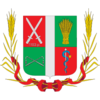Tokmak Raion
Tokmak Raion
Токмацький район | |
|---|---|
 | |
| Coordinates: 47°11′29.63″N 35°42′33.46″E / 47.1915639°N 35.7092944°E | |
| Country | |
| Region | Zaporizhzhia Oblast |
| Established | March 1923 |
| Disestablished | 18 July 2020 |
| Admin. center | Tokmak |
| Subdivisions | 2 hromadas |
| Area | |
• Total | 1,400 km2 (500 sq mi) |
| Population (2020) | |
• Total | |
| Time zone | UTC+02:00 (EET) |
| • Summer (DST) | UTC+03:00 (EEST) |
| Postal index | 71716—71775 |
| Area code | +380 6178 |
Tokmak Raion (Ukrainian: Токмацький район) was one of the raions (districts) of Zaporizhzhia Oblast in southern Ukraine between 1923 and 2020. The administrative center of the region was the small city of Tokmak. Before 1962, it was known as Velykyi Tokmak Raion (Ukrainian: Великотокмацький район). The last estimate of the raion population was 21,330 (2020 est.).[1]
Geography
[edit]The raion had an area of 1,400 square kilometres (540 sq mi), with 1,103,000 hectares of arable land.[2]
History
[edit]The raion was established in March 1923 as Velykyi Tokmak Raion, as Velykyi Tokmak was still the name of Tokmak at the time. It was located within Melitopol Okruha of Yekaterinoslav Governorate in the Ukrainian Soviet Socialist Republic.[2] The okruhas were abolished at the end of the 1920s, and Velykyi Tokmak Raion was assigned to Dnipropetrovsk Oblast. On 10 January 1939, part of Dnipropetrovsk Oblast's territory was split off, and Velykyi Tokmak Raion became part of the newly created Zaporizhzhia Oblast.[3] In December 1962, Velykyi Tokmak was renamed to Tokmak, and Velykyi Tokmak Raion was renamed Tokmak Raion accordingly. Tokmak was also designated a city of oblast significance - meaning that while it still served as the administrative center of the raion, it was no longer part of it, instead being subordinated directly to Zaporizhzhia Oblast.[2]
The administrative structure of Tokmak Raion was reformed on 12 June 2020, with the division of it into two hromadas: Tokmak urban hromada and Molochansk urban hromada. Tokmak was once again subordinated to Tokmak Raion, as the city of oblast significance designation was abolished.[4] Tokmak Raion was abolished on 18 July 2020 as part of the administrative reform of Ukraine, which reduced the number of raions of Zaporizhzhia Oblast to five. The area of the former Tokmak Raion was merged into Polohy Raion.[5][6]
Demographics
[edit]| Population history | |||
|---|---|---|---|
| Year | 1970 | 2011 | 2020 |
| Pop. | 34,600[2] | 24,090[7] | 21,330[1] |
| ±% p.a. | — | −0.88% | −1.34% |
| All statistics exclude Tokmak proper. | |||
As of January 1, 2020, the raion had an estimated population of 21,330 people. Of these, 6,327 lived in the only city in the raion Molochansk, and 15,003 lived in rural areas outside Molochansk.[1]
References
[edit]- ^ a b c Чисельність наявного населення України на 1 січня 2020 року / Population of Ukraine Number of Existing as of January 1, 2020 (PDF) (in Ukrainian and English). Kyiv: State Statistics Service of Ukraine. Archived (PDF) from the original on 28 September 2023.
- ^ a b c d "Токмак, Токмацький район, Запорізька область". Історія міст і сіл Української РСР (in Ukrainian).
- ^ Зубченко, О. С.; Ніколаєв, В. А. (2010-02-01). "Запорізька область". Encyclopedia of Modern Ukraine (in Ukrainian). Vol. 10. Інститут енциклопедичних досліджень НАН України. ISBN 978-966-02-2074-4.
- ^ "Про визначення адміністративних центрів та затвердження територій територіальних громад Запорізької області". Офіційний вебпортал парламенту України (in Ukrainian). Retrieved 2023-12-08.
- ^ "Про утворення та ліквідацію районів. Постанова Верховної Ради України № 807-ІХ". Голос України (in Ukrainian). 2020-07-18. Retrieved 2020-10-03.
- ^ "Нові райони: карти + склад" (in Ukrainian). Міністерство розвитку громад та територій України.
- ^ "Чисельність наявного населення України на 1 січня 2013 року. Державна служба статистики України. Київ, 2013" (PDF). p. 64. Archived from the original (PDF) on 2013-10-12. Retrieved 2017-05-02.


